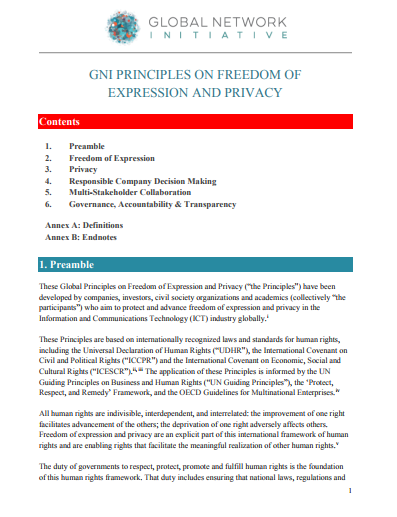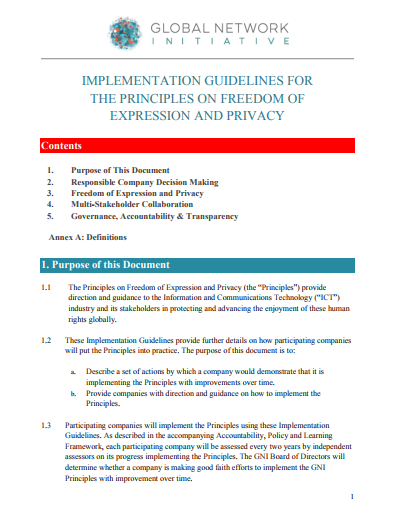Preamble
These Global Principles on Freedom of Expression and Privacy (“the Principles”) have been developed by companies, investors, civil society organizations and academics who aim to protect and advance freedom of expression and privacy in the Information and Communications Technology (ICT) industry globally.
These Principles are based on internationally recognized laws and standards for human rights, including the Universal Declaration of Human Rights (“UDHR”), the International Covenant on Civil and Political Rights (“ICCPR”) and the International Covenant on Economic, Social and Cultural Rights (“ICESCR”). The application of these Principles is informed by the UN Guiding Principles on Business and Human Rights (“UN Guiding Principles”), the ‘Protect, Respect, and Remedy’ Framework, and the OECD Guidelines for Multinational Enterprises.
All human rights are indivisible, interdependent, and interrelated: the improvement of one right facilitates advancement of the others; the deprivation of one right adversely affects others. Freedom of expression and privacy are an explicit part of this international framework of human rights and are enabling rights that facilitate the meaningful realization of other human rights.
The duty of governments to respect, protect, promote and fulfill human rights is the foundation of this human rights framework. That duty includes ensuring that national laws, regulations and policies are consistent with international human rights laws and standards on freedom of expression and privacy.
ICT companies have the responsibility to respect and promote the freedom of expression and privacy rights of their users. ICT has the potential to enable the exchange of ideas and access to information in a way that supports economic opportunity, advances knowledge and improves quality of life. By implementing these Principles, ICT companies can also work to protect, promote and support human rights, including through improved responsible decision-making, shared learning and multi-stakeholder cooperation.
The cooperation between the ICT industry, investors, civil society organizations, academics and other stakeholders can strengthen efforts to work with governments to advance freedom of expression and privacy globally.
ICT companies should comply with all applicable laws and respect internationally recognized human rights, wherever they operate. If national laws, regulations and policies do not conform to international standards, ICT companies should avoid, minimize, or otherwise address the adverse impact of government demands, laws, or regulations, and seek ways to honor the principles of internationally recognized human rights to the greatest extent possible. ICT companies should also be able to demonstrate their efforts in this regard. For these reasons, these Principles and their accompanying Implementation Guidelines establish a framework to provide direction and guidance to the ICT industry and its stakeholders in protecting and advancing the enjoyment of human rights globally.


